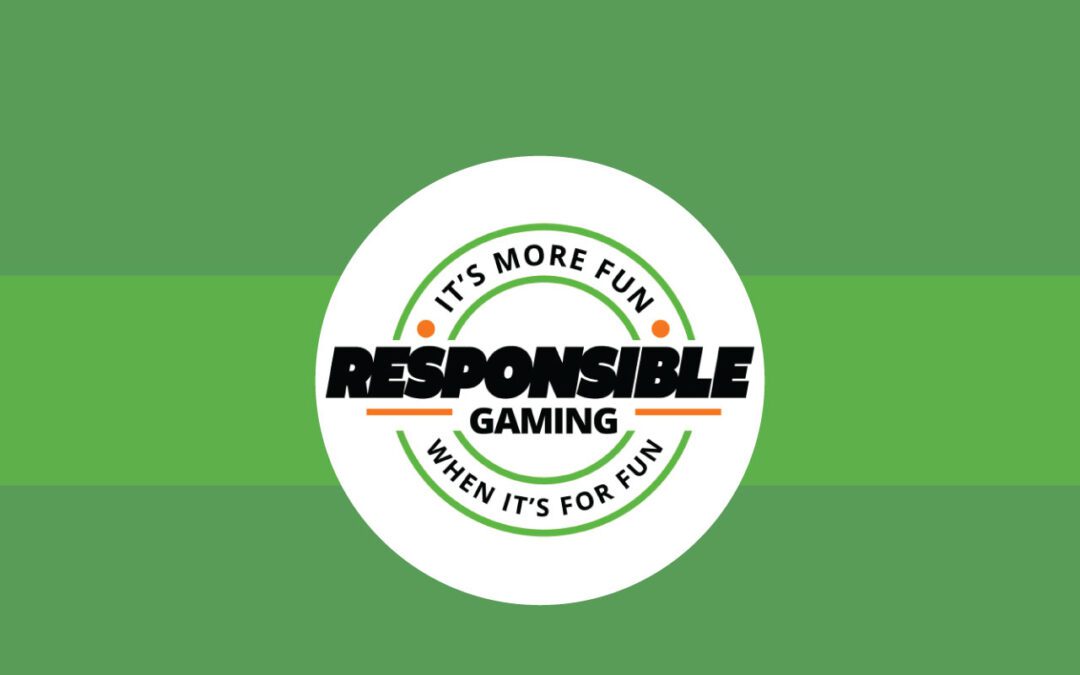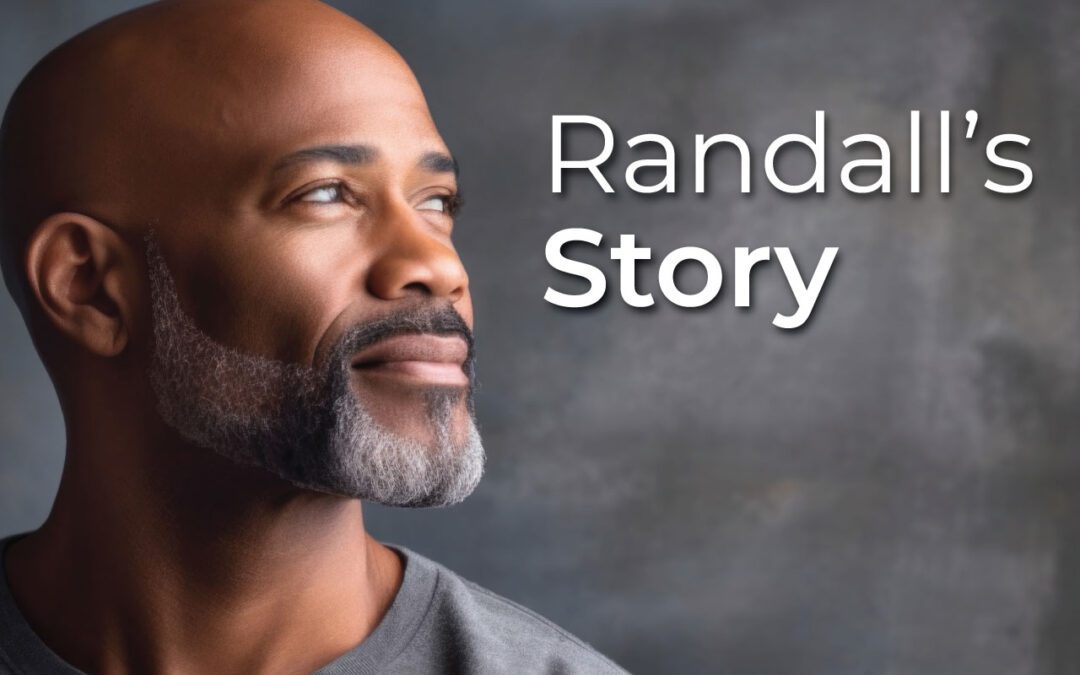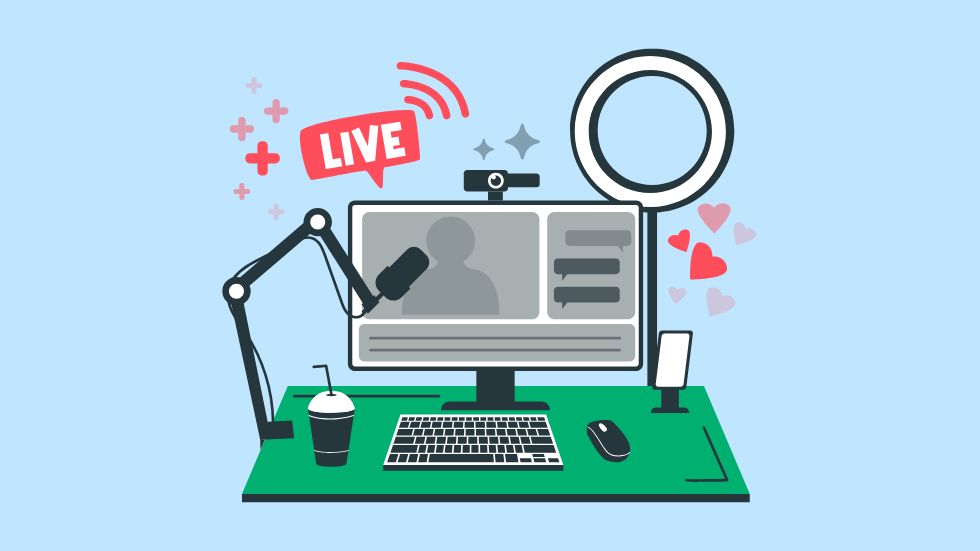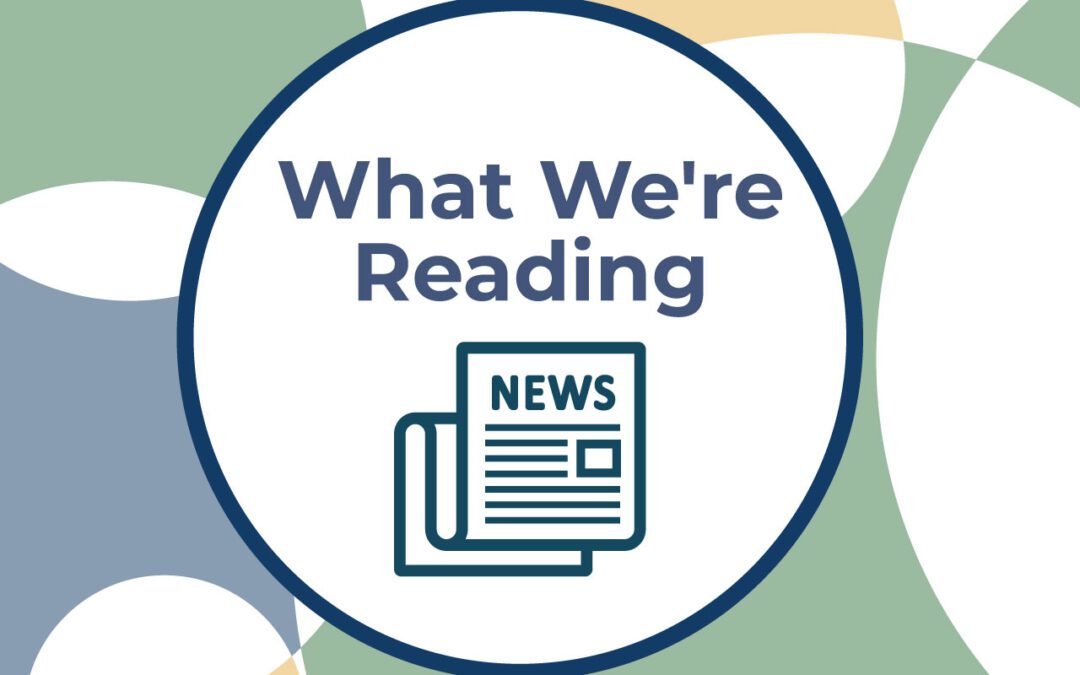
Dec 17, 2025 | HEALTHY PLAY, HELP, PROBLEM GAMBLING, RESOURCES, SPORTS BETTING
MNAPG posed questions to Lori Kalani, DraftKings’ chief responsible gambling officer to learn more about DraftKings’ problem gambling efforts. Below are her responses:
MNAPG: We understand that My Budget Builder and My Stat Sheet are new responsible gaming (RG) tools for DraftKings. Can you share more about them?
LK: My Budget Builder guides customers through a simple process to set personalized entertainment budgets, reminders and limits. My Stat Sheet provides customers with a clear personalized snapshot of their play activity, including time spent, deposits, withdrawals, wagers and outcomes. Both are designed to help customers make informed decisions and play responsibly.
MNAPG: What information is included with alerts and does anything happen if a customer exceeds the limits they set?
LK: We proactively encourage every player to set budgets for their deposit amounts, play time and size of bets, and we provide access to a range of tools and resources with which they can engage. Customers receive reminders when they approach the limits they’ve set. If a limit is reached, the platform enforces it automatically—for example, preventing additional deposits or gameplay until the current limit resets. Once a limit is set, it cannot be increased or cancelled until the timeframe for the limit has ended. More restrictive limits can be added at any time.
MNAPG: How many customers are currently using some of DraftKings’ responsible gaming tools and resources?
LK: Since launching our Responsible Gaming Center in 2024—a centralized hub for all the DraftKings RG tools and resources available at rg.draftkings.com—more than 5.6 million customers have visited. Approximately 3.5 million unique customers have used My Stat Sheet since the industry-first tool was introduced early last year. This June, we launched our newest tool, My Budget Builder, and we expect usage to increase throughout the NFL season.
MNAPG: How do you help make customers aware that these tools and resources exist?
LK: We highlight responsible gaming tools and resources throughout the customer journey. Some examples include promoting RG tools and resources at onboarding, in-app messaging, emails and various campaigns throughout the year. Within the app and online, an RG shield icon appears at the top of the screen, making the DraftKings Responsible Gaming Center just one click away so that tools and resources are seamlessly available as part of the product experience. To mark this year’s Responsible Gaming Education Month, we launched an NFL sweepstakes that incentivizes customers who use tools like My Budget Builder and My Stat Sheet with the chance to win weekly NFL ticket prizes, culminating in a grand prize trip to the Super Bowl.
MNAPG: Do you work with any external organizations or researchers to improve your responsible gaming efforts?
LK: Yes. We work with organizations such as the Cambridge Health Alliance, BetBlocker, Evive, the Responsible Online Gaming Association (ROGA) and the International Center for Responsible Gaming. Our work with Cambridge Health Alliance includes expanding research on responsible gaming and facilitating new opportunities to educate customers about the tools and resources that are available to help them play responsibly. We also provide funding to the National Council on Problem Gambling. DraftKings’ State Council Funding (SCF) program provides annual donations to 35 state problem gaming councils across the country to support their work. Since announcing the SCF program in 2022, we have donated millions of dollars, including to the Minnesota Alliance on Problem Gambling. (Editor’s note: MNAPG used the funds provided by DraftKings to develop a pilot casino employee training program that’s currently being tested at Canterbury.)
MNAPG: Do you proactively identify customers who may be having challenges? If so, how is this done?
LK: We proactively encourage every player to set budgets for their deposit amounts, play time and size of bets, and we provide access to a range of tools and resources with which they can engage. We use modeling techniques and advanced technology, including machine learning, to help identify when someone may no longer be playing for fun, which is then reviewed by our Responsible Gaming team for further analysis.
MNAPG: Does DraftKings work with the other members of the Responsible Online Gaming Association (ROGA) to ensure that if one of your customers is given a time out or excluded that it is active across all the other platforms?
LK: Today, most jurisdictions where we operate maintain shared exclusion databases, which are distributed to all licensed operators. In some states, operators also contribute their own self-exclusion data. While there isn’t yet an industry-wide system among operators, through ROGA we have announced the creation of a centralized exclusion clearinghouse. The first phase will introduce a national shared self-exclusion list so that when a player self-excludes with one member operator, that exclusion will also extend across all ROGA member platforms.
MNAPG: How do you see your RG tools and resources evolving over the next 2–3 years?
LK: In the next few years, we expect RG tools and resources to further evolve through AI and personalization. Smarter technology will allow these tools and resources to adapt dynamically, making them even more intuitive and seamless to the customer.
MNAPG: How do you measure success in responsible gaming initiatives?
LK: We consider, among other things, adoption rates, customer feedback and independent evidence-based research as we continue to enhance our responsible gaming tools and resources. Success means responsible play continues to be embedded in the DraftKings experience for every customer.

Dec 17, 2025 | HELP, PROBLEM GAMBLING, RECOVERY, STORIES
I’m 42 years old, and I never thought gambling would take over my life the way it did. Growing up, I played lotto tickets occasionally, but it was harmless, nothing more than a little game. I could walk away without a second thought. Gambling didn’t become a real problem until about 10 years ago, and even then it wasn’t because I suddenly developed a taste for it. It was because of a medication.
I was diagnosed with bipolar disorder and put on a drug called Latuda. At the time, I didn’t know that one of its rare side effects was compulsive gambling. It’s right there in the warnings, but no one ever told me. Looking back, it feels like a switch flipped in my brain. All of a sudden, I couldn’t stop.
Poker and electronic machines became my games of choice. Omaha, Hold ’Em, slots and electronic pulltabs, which were a real curse for me. I could be up thousands of dollars, but by midnight it was gone. Friends and family would urge me to cash out, but I couldn’t.
The first time I realized I was addicted to gambling was in 2016. But I didn’t talk to a therapist about it until years later. By then, gambling had already destroyed so much of my life. It pushed me into doing things I never imagined myself capable of. I borrowed money I couldn’t repay, stole from people I loved and even stole credit card information from a friend on her deathbed.
My addiction led me to commit aggravated armed robbery. I was preparing to go to treatment at Project Turnabout, waiting for medical records to clear, and in the middle of that chaos I made a bad decision. I got caught and went to prison for 33 months. I asked the judge to send me to treatment instead, but he wouldn’t.
There are no real gambling programs in the prison system, and I struggled in there. Gambling is everywhere—sports bets, high-stakes spades games, etc.—with considerable money moving through canteen accounts. The system hides it from the outside world, but it’s real. I even talked with a chaplain about starting a GA group inside the prison. He told me, “If you can find a volunteer, we’ll do it.” But no one ever stepped up.
Since getting out, I’ve been working with a counselor through Club Recovery. I’ve had stretches of abstinence—four months clean at one point—but I’ve struggled too. I even put Gamban on my phone to block gambling apps, but then I bought a new phone so I could gamble again. That’s how strong the pull can be. But I’ve realized I can’t be a hypocrite. If I want to help others, I have to stay clean myself.
I’m starting a new Gamblers Anonymous group in Little Falls. Zoom meetings didn’t work for me—they didn’t feel personal enough. I wanted a place where people could sit down face-to-face, look each other in the eye and admit what’s really going on. There’s an epidemic of gambling up there. People buy pulltabs by the box, yet most don’t think of gambling as a real addiction.
That’s bullshit. I know firsthand how destructive it is.
Starting the GA group wasn’t easy. I had to call GA International, get a starter kit, work with the library to secure space, put flyers up in hospitals, bars, even in the local paper and radio. But it matters. These programs hold me accountable, and hopefully they’ll give others the same chance.
I’ve thought about suicide from time to time. But one day, a driver told me about his best friend who killed himself because of gambling. Hearing that cracked me open. I teared up in the car and knew it was time for me to step up—for myself, for others and for my family.
Thanks to gambling, I’ve lost a lot—money, relationships, trust. Some of those losses I’ll never get back. But I’m trying to move forward. I want to bring GA into prisons. I want to write a blog about addiction and suicide. I want to make sure others know they’re not alone, and that gambling addiction is every bit as real and dangerous as alcohol or drugs.
I can’t change the past, but I can use it. If sharing my story helps one person stop before they lose everything, then it’s worth it.

Dec 17, 2025 | PROBLEM GAMBLING
For many problem gamblers, tax season delivers an unwelcome surprise: a hefty bill on gambling winnings they may no longer have. It’s also often the moment when friends or loved ones first learn the full extent of the gambling.
The problem usually comes to light after the government audits winnings reported by casinos or other gambling entities. “Some gamblers may even face criminal charges for not paying the government and may have already spent their winnings,” says Matthew Wildes, a tax attorney and CPA with Wildes At Law in Roseville.
Why Minnesota gamblers are hit especially hard
A major driver of these unexpected debts in Minnesota is the state’s alternative minimum tax (AMT). Unlike current federal rules, Minnesota’s AMT does not allow gamblers to offset winnings with losses. “AMT is based on gross income,” explains Matthew. “Once your income reaches a certain level, the state labels you a high-income earner, which limits your deductions.” The system, he notes, was designed back when gambling was still illegal in the state.
The impact can be devastating. “I once had a client whose winnings created a tax bill of about $100,000—more than his $70,000 in annual wages,” says Matthew.
Matthew is now challenging the law in court, arguing it violates Minnesota’s Uniformity Clause, which requires that taxpayers in the same category be treated equally. “Essentially, we’re saying the law discriminates against those with a gambling addiction,” he explains.
Strategies that can help
In defending clients, Matthew has identified ways to soften the blow. One is using the “session method” of accounting, an IRS-approved strategy that allows gamblers to report net results over a session—such as a day—rather than every single jackpot. For example, a gambler who wins big but also loses on the same day can report lower net winnings, reducing taxable income.
Casinos often track this information through player card systems. “Players who are registered with a casino usually have access to detailed records of their daily wins and losses,” Matthew says. “Having this documentation can reduce a gambler’s tax liability by thousands of dollars.”
Matthew keeps a record of which casinos provide these reports and urges clients to obtain them. “Getting this information on the front end is beneficial—whether you’re working with a professional tax preparer or trying to avoid problems that could escalate later,” he says.
In contrast to recreational gamblers, professional gamblers keep better records of daily wins and losses, lowering their tax bills. In fact, professional gamblers are not subject to the AMT law because, as a business, they can legally claim deductions for their losses. Matthew says that some gamblers try to fake being professional so they can take advantage of these benefits.
A call for fairness
Unlike criminal courts, where gambling addiction can sometimes reduce penalties or lead to treatment-focused alternatives, tax courts offer no such flexibility.
“From a public policy perspective, the Department of Revenue needs to be more lenient before cases like these go to tax court,” says Matthew. “There needs to be greater understanding of the hidden issues at play.”

Dec 17, 2025 | PROBLEM GAMBLING
Note: Much of the information included in this article is taken from a presentation by Glenn Yamagata, vice president of Data Science and Economic Analysis and senior consultant with Problem Gambling Solutions, Inc., executive director of the Oregon Council on Problem Gambling, and member of the National Council on Problem Gambling Board of Directors.
For many of us, digital assets, including cryptocurrencies, are something we’ve heard of but don’t fully understand. The same is true for Oregon Health Authority problem gambling treatment providers: 94% reported needing additional training to better address clients engaged in non-traditional forms of gambling, such as digital asset trading. Some providers indicated that as many as half of their clients are already involved in these activities. Therefore, developing a basic understanding of digital assets and how they function can be valuable, much like a therapist treating individuals who wager on sports benefits from knowing key sports betting terminology.
Common digital assets include e-books and digital art that are accessed online. However, the digital assets discussed in this article refer specifically to blockchain-enabled assets, such as cryptocurrencies. The blockchain is a type of electronic ledger with key features such as transparency, security and decentralization, which can be complex to understand. The essential point is that blockchain technology has made it possible to create new forms of digital assets that, in some cases, enable gambling-like behavior and may contribute to gambling problems for some individuals.
Cryptocurrencies
A cryptocurrency is a digital asset built on a blockchain, with the oldest, largest and most recognized example being Bitcoin. Some individuals engage in day trading or swing trading of cryptocurrency assets in ways similar to how they trade traditional assets such as stocks or bonds. However, cryptocurrency trading can be particularly addictive for several reasons.
- Trading hours:Unlike traditional financial markets, cryptocurrencies trade 24 hours a day, 7 days a week, 365 days a year. This constant availability creates endless opportunities to trade and can facilitate impulsive or compulsive behaviors.
- Market volatility: Cryptocurrencies often experience much greater price fluctuations than traditional assets, generating heightened excitement and anticipation among traders, which can reinforce risk-taking and reward-seeking behaviors.
- Speculative nature: High price volatility, limited fundamental valuations, regulatory uncertainty and the general characteristics of emerging markets make cryptocurrency trading more speculative and attractive to some individuals.
- Higher leverage: Cryptocurrency markets often allow for significantly higher leverage, sometimes 50 to 100 times the initial investment. This means individuals can amplify their gains (or losses) by a much greater multiple than is typically possible with traditional financial products.
Based on the Oregon Gambling Attitudes, Behaviors, Health and Risk Survey (2025), a report commissioned by the Oregon Council on Problem Gambling, adult Oregonians who engaged with cryptocurrencies were six times more likely to be classified as high risk for gambling disorder, as measured by the Problem Gambling Severity Index (PGSI).
Non-fungible tokens (NFTs)
Common NFTs include digital media such as music and visual art, where creators assign uniqueness to the work, similar to how a musician might sign an album cover or a photographer might add a personalized note to a print to make it one of a kind. This uniqueness increases the asset’s value, allowing it to be traded, as seen when the artist Beeple sold a digital collage of 5,000 individual artworks for $69 million at Christie’s Auction House in 2021.
NFTs are increasingly being introduced across a variety of asset forms and within gaming environments, creating new opportunities for speculative and gambling-like behavior. Some examples include:
- Gaming currency: NFTs are used as a means to make wagers in online casinos, replacing traditional methods such as credit cards and bank transfers. The advantages include player anonymity, low transaction fees and global accessibility without the need for fiat currency exchange.
- Prizes: NFTs can serve as prizes that have the potential to appreciate in value, making them especially attractive to players who see an opportunity for ongoing financial gain.
- Player-to-player payment option: NFTs have become a suitable payment method for transactions carried out between players; the transactions are viewed as safe, secure, anonymous and do not require a third party.
- Loyalty program awards: Online casinos use NFTs for customer acquisition and to incentivize loyalty. As unique digital assets, NFTs can serve as a differentiating factor that attracts and retains customers.
NFTs are connected to problem gambling behaviors through speculative activity, such as the short-term buying and selling of digital assets, and by enabling gambling-like ecosystems, including virtual casinos.
Decentralized finance (DeFi) applications
Decentralized finance (DeFi) applications are financial systems that enable individuals to transact directly with one another, without intermediaries such as banks. Many rely on self-executing “smart contracts,” in which financial terms are codified and stored on the blockchain.
DeFi platforms can foster gambling-like behavior by offering a highly speculative, largely unregulated environment that is easily accessible. They blend elements of cryptocurrency trading, prediction markets and gaming, blurring the line between investing and gambling.
Conclusion
The cryptocurrency, NFT and DeFi markets continue to grow rapidly. The cryptocurrency market alone is currently valued at around $3 trillion and is expected to expand significantly over the next decade. As these markets evolve, it is likely that more individuals will seek help from therapists for gambling-like addictions. Treatment providers would be well advised to develop at least a general understanding of these emerging platforms to better recognize and address the risks they pose.

Nov 26, 2025 | PROBLEM GAMBLING, YOUTH GAMBLING
Read the original article on the BASIS here.
By Kira Landauer, MPH
Livestreaming is a popular form of digital entertainment that allows viewers to watch content online as it happens live. Gambling livestreams are popular on platforms like Twitch and TikTok Live, where streamers broadcast themselves gambling with real money and in real time—playing games like online slots or placing sports bets. Audiences can watch the gameplay, listen to the streamer’s commentary, and interact directly with both the streamer and other viewers. What may seem like harmless fun could be problematic for some, with research linking gambling livestream viewership to future gambling intentions and problem gambling. This week, as part of our Special Series on Addiction and Technology, The WAGER reviews a study by Chelsea Hughes and colleagues that examined young adults’ experiences with and perceptions of gambling livestreaming.
What were the research questions?
(1) What motivates young adults to watch and engage with gambling livestreams? (2) How do they perceive their livestream viewing experiences?
What did the researchers do?
The researchers conducted semi-structured interviews with 15 young adults (ages 18 to 24) in the U.K. who regularly watched gambling livestreams (at least once a week) and had gambled in the past year. Participants described their reasons for watching, how they engaged with the livestreams, and their experiences as a viewer. Using thematic analysis, the researchers identified themes related to the meaning and value viewers attributed to their experiences.
What did they find?
The researchers identified three themes (see Figure).
- Social experiences and vicarious excitement describes the parasocial bonds viewers formed with streamers. Even as observers, viewers felt they were sharing in the streamer’s risk-taking and excitement, which created a sense of emotional connection. Many watched not only for gambling content but because they enjoyed the streamer’s personality.
- Interactivity and building loyalty highlights how livestream features—like gamified loyalty (earning points for engaging with the stream) and interactive prediction tools (wagering points on outcomes)—encouraged viewers to participate and feel more invested in the livestream’s outcomes.
- The urge and harm paradox reflects how participants viewed livestreams as a safer way to manage gambling urges, even though watching sometimes intensified those same urges. Some reported that watching livestreams contributed to an increase in their own gambling participation, despite recognizing the influence of streamers’ deceptive marketing tactics.
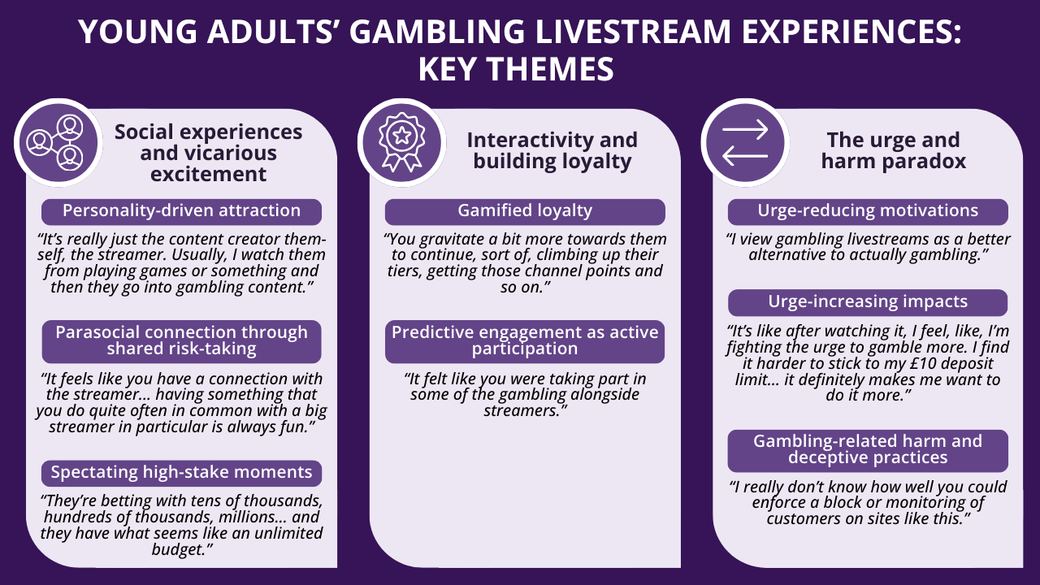
Figure. Key themes from young adults’ gambling livestream viewership, with quotes highlighting each subtheme. Click image to enlarge.
Why do these findings matter?
These findings show that young adults are drawn to gambling livestreams for various, often intertwined, reasons. Many viewers feel a personal connection to their favorite streamers. This sense of social connection and community is enhanced by interactive, gamified livestream features that encourage viewer engagement. These findings can inform regulatory policies intended to reduce potential harms. For example, streaming platforms might limit or ban gambling livestreams, or restrict gambling operators from advertising through streamers. The study also indicates that watching these streams is not a reliable way to manage gambling urges, and that for some viewers it may actually worsen cravings. Gambling treatment providers should be aware of gambling livestreams and factor the effects of watching and engaging in these streams into return-to-gambling prevention planning.
Every study has limitations. What are the limitations in this study?
More than half of the sample gambled frequently (20+ times in the past month) and were high-risk gamblers according to the Problem Gambling Severity Index. Therefore, these findings may not be generalizable to low-frequency or low-risk gamblers, or to contexts outside the U.K. where streaming culture, gambling culture, and regulations might differ. Finally, the study cannot determine the causal relationship between livestream viewership and gambling behavior.

Sep 5, 2025 | PROBLEM GAMBLING, SPORTS BETTING
This article, published in USA Today, provides a great depiction of how young men are immersed in high-risk sports betting.
This article highlights the lack of oversight for the digital environments children access online through the metaverse, certain video games and apps, and emphasizes the challenges parents face in protecting their kids.
Sweepstakes operators rely on the legality of their “promotional contest” model, which requires a free method of entry to preserve their claim to non-gambling status. It’s a gray area that seems very gambling-like, but is not subject to regulatory attention.
This USA Today article (published June 3, 2025) explores the rising crisis of sports betting addiction among young men, particularly college-aged and early adults. It highlights how easily accessible mobile betting platforms, aggressive marketing tactics and features like in-play bets are fueling compulsive gambling, while warning that the U.S. lacks comprehensive treatment infrastructure or national tracking of gambling disorders.
Page 1 of 1412345...10...»Last »
